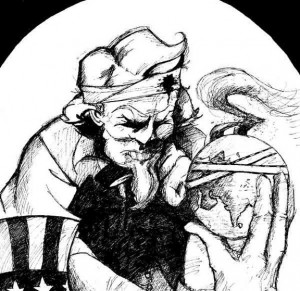“We Endured the Blow”: A New Yorker’s Recounting of 9/11
- Share
- Tweet
- Pin
- Share
Ten years after the Sept. 11, 2001 attacks killed 2,977 people and shook the nation to its core, Ground Zero is still a construction site, the United States is still embroiled in two wars, and our defense budget is conservatively pegged at more than twice what it was before the attacks.
Yet, Ken Silber, an economics and politics writer and native New Yorker, says that the state of the nation today is “pretty far to the optimistic end of the spectrum.”
“If you had told me then, in the days after Sept. 11, that life in America would be the way it is now, I would have said that it was a relatively good scenario.” ~ Ken Silber
“If you had told me then, in the days after Sept. 11, that life in America would be the way it is now, I would have said that it was a relatively good scenario.”
Optimism is not exactly the word of the day. Our politics are as fractured as ever. Our economy is in its third year of teetering on edge. For many of us, our jobs seem less secure by the day.
But we’ve largely forgotten just how shocked we were on that Tuesday morning, just how afraid we were, just how much we thought the American way of life had suddenly become a distant memory.
Dawn of a New Normal
Ken Silber grew up in Queens, N.Y. and was working as a freelance writer from his home on Manhattan’s Upper West Side on Sept. 11, 2001. That morning he was returning home from voting in a primary election when he turned on NY1, the local news channel, to see that a plane had crashed into the World Trade Center’s North Tower, about five miles south of his home.
“It was thought, at that point, to be an accident,” he said. “It was the second plane that changed everyone’s idea of what it was. I remember having trouble believing that what I was watching was real. My brain was unable to absorb it.”
That afternoon he walked to Mt. Sinai Medical Center to give blood, but they didn’t need any. There weren’t going to be many survivors.
As he walked, he passed people streaming northward from the financial district downtown. His day, however, was much less tumultuous, mostly watching events unfold on TV.
“I remember being distraught, but I didn’t quite grasp what it really meant,” he remembers. “The full significance of it took a while to sink in.”
A few weeks later Silber went to the funeral of a friend of a friend in Rockland County. The service was for a 30-year-old firefighter named Robert McPadden, who died when the South Tower collapsed, leaving behind his young wife Kate.
“It was a very intense experience,” he says. “A very harsh, harsh moment. There were so many funerals around the city.”
The stories of those lost would filter onto the pages of newspapers and websites for weeks. Their family photos, full of life, a sad contradiction to the suddenness of their death. This was the new America, it seemed. Funerals, pain, fear. Silber, like so many others, braced himself for the new normal.
“For days it was impossible to make any type of plans,” he said. Everything had a caveat – “If nothing happens, we’ll meet here. For all I knew, my own life in New York City was going to be like people in the Civil War. You never knew what was going to happen.”
Soldiers were stationed at airports and train stations. Fighter jets patrolled regularly over Manhattan. There was a sense that further attacks were inevitable. News reports questioned whether we had seen the end of the age of skyscrapers. Would anyone invest in them again? Would anyone want to work in them? Would anyone insure them?
We were afraid to fly. Would the airline industry survive?
Would New York City as we knew it survive?
Ten years later these questions seem almost absurd. A new tower is rising from the site of the former World Trade Center. We still fly, and grumble about all the security. Tourists flock to the bright lights of New York.
A Resilient City
“Some things have changed permanently,” Silber says from his home, no longer in New York City. He moved to the New Jersey suburbs in 2007, about 25 miles from Ground Zero. “I think 9/11 is still in the back of people’s minds here. There’s still a noticeable security presence. But the city has proven itself to be pretty resilient.”
Al Qaeda, Silber recently wrote for Research, a magazine for financial advisors, had “a perceptive grasp of the sources of national power,” when they targeted the World Trade Center, “substantive and symbolic wellsprings of American economic might.”
“From the very beginning, a strong financial sector has been a source of our power in the world,” Silber says. “Fortunately they were wrong about it causing an economic and financial collapse.”
The stock market plummeted, but by Nov. 9, 2001, it closed above Sept. 10 levels.
But now, Silber worries, an attack could be more devastating. The visuals weren’t as devastating, the human toll incomparable, but the mortgage crisis that sunk Wall Street in 2008 was far more damaging to the American economy than the terrorist attacks executed by Al Qaeda on Sept. 11, 2001.
“With our economic vulnerabilities today, what would happen if there were another 9/11 style attack?” Silber asks. “I don’t know that we would weather it as well.”
But 10 years later, for better or worse, American life is much closer to normal than most would have predicted as we stared at a Lower Manhattan engulfed in a cloud of dust in September of 2001, Silber says.
“We endured the blow of 9/11 better than anyone might have expected.”
To read Silber’s article “Wall Street at War,” about Wall Street’s response to 9/11, click here


